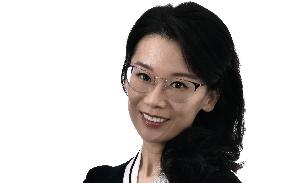 The conference was held in Downtown Los Angeles.
The conference was held in Downtown Los Angeles.
LOS ANGELES—Just when we adjusted to millennials, there is a new generation descending on the office market. Generation Z, the generation following millennials, is preparing to enter the job market meaning that there will be three generations working alongside one another. At NAIOP’s O.CON event in Downtown Los Angeles, experts—Jason Hickey, president and CEO of Hickey & Associates; Barbara Bouza, managing director and principal at Gensler; and Richard De Jesu, SVP of human resources at Northern Trust Corp.—discussed how workplaces must conform to a multigenerational workforce.
According to Hickey, each generation has its own work tactics and culture, and corporations need to identify a corporate culture that all generations are comfortable with. For millennials, that change has come with more open workspaces and work day structures that promote a healthy work/life balance, which is one of the most important qualities to millennials. Gen Z will have an even more extreme view on the workplace than the millennial generation. Once this group enters the workforce, it will be the most educated generation in history and will be highly skilled.
As a result, work place design has adapted smaller spaces with an average of 120 square feet per person and features like sharable desks, according to Bouza. “Workplace design can help drive innovation. It is an investment in the individual.” Well being design, which includes childcare and food options, and diversified group spaces for collaboration and innovation have become required amenities for workers.
Design isn’t the only factor. Hickey says that companies should be building a culture around these ideologies. Millennials and Gen Z, for example, need to feel like they are apart of something bigger than themselves and that the work they are doing is “changing the world or at least changing the industry,” said Hickey. They want to be mobile and they want to be able to take advantages of opportunities in the company and in their personal lives, like working in a global office for a year, for example. While wages do contribute to decisions, Hickey says that more conceptual ideas in culture also play a factor for these generations.
To close the discussion, De Jesu shared a case study from Northern Trust Corp.’s experience adopting a new open workplace. They put the decision making in the hands of the employees to determine the best locations and configurations, and also factored in client convenience and customer service. The firm ultimately moved out of the CBD and split its office into two, one on the West Side and another in the San Gabriel Valley. “We democratized the process and tried to create an environment that people would want to stay in,” he said. The new office has an open workspace and hoteling for desks, but the most dramatic change is the implementation of teleworking. Employees can choose their own schedule and work from home. While millennials adjusted more easily than the older generation, everyone ultimately was on board and the outcome has been positive. “I think this builds collaboration and helps different generations come together,” he said. “That is what people want.”

















 Copyright © 2024 ALM Global, LLC. All Rights Reserved.
Copyright © 2024 ALM Global, LLC. All Rights Reserved.